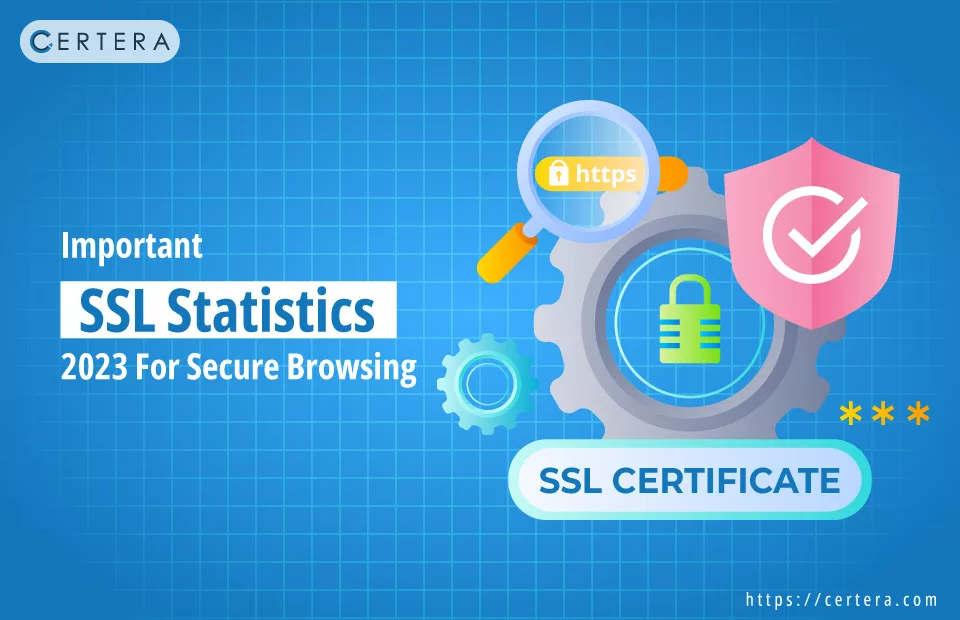Revealing Important SSL Statistics 2023 For Secure Browsing in 2024

Maintaining the confidentiality and authenticity of online communication has become essential in today’s connected digital environment, as information moves freely over enormous networks.
The Internet is not exempt from challenges; nothing extraordinary comes without difficulty. People unintentionally and intentionally post a lot of sensitive data online these days.
But staying updated with the latest developments is critical because the SSL certificate market is constantly changing. We have compiled the most appropriate information to depict the SSL certificate industry in 2023.
Many people with bad intentions take advantage of this daily and exploit the security hole. SSL certificates are a fundamental component of digital security. To encourage more robust internet encryption, check the following SSL stats!
Facts, Trends, and Statistics for SSL in 2023
The top five nations that utilize SSL by default are the US, the UK, Germany, Russia, and Japan. In the US, over thirty million websites reportedly employ SSL by default.
Certera, Sectigo, and DigiCert Certificate Authorities are the top suppliers of SSL certificates, with millions of customers and significant market shares.
The use of SSL certificates is widespread and doesn’t appear to be slowing down. On the other hand, as time goes on, positive SSL numbers rise, and security flaws decrease. There is still a long way to go until all the Web is encrypted.
Look at the Below SSL Statistics to Assess the Current Situation.
An Aggregate of 85,167,054 SSL Certificates have been found on the Internet.
This is predicted based on BuiltWith research conducted in 2023. Even if this figure were precise when these SSL statistics were recorded, it would have altered by now.
The quantity is ever-changing, as some SSL Certificates expire, and others are issued. The trend indicates an increase in numbers.
Domain Validation accounts for 94.3% of SSL Certificates.
According to a Netcraft analysis, Domain Validation SSL Certificates control 94.4% of the Web. Extended Validation SSL has a 0.1% market share, compared to 5.5% for Organization Validation Certificates.
However, looking at the percentage of traffic by certificate type also indicates that premium certificates have a specific position. DV sites acquire 60% of all traffic, OV sites get 27%, and EV sites acquire 13%.
In Alexa’s Top 100,000 Rated Websites, over 21% Do not Use HTTPS.
20,911 of the top 100,000 websites were deemed to be insecure due to their use of HTTP, according to WatchGuard’s 2023 Internet Security Report.
No website should utilize port 80 instead of encrypted port 443 for plaintext sharing, especially if it is so popular that it comes in the top 100,000.
Recommended: Port 80 (HTTP) vs. Port 443 (HTTPS): Everything to Know About the Protocols
Secure HTTPS Pages account for 93.2% of Chrome Users’ Surfing Time.
Google Transparency Report shows that the average surfing duration is greater than the percentage of loaded pages, suggesting that consumers are more likely to leave a website fast if they find it lacks security measures.
There are a few differences across the platforms regarding browsing time. Users of Chromecast and Macs are impressively 98% and 97%, respectively. On the other hand, Windows and Android users hover around the 94% threshold, while Linux users score lowest at 86%.
Determining if a Website is Encrypted or Not.
There are several techniques to assess a website’s security. To begin with, the https:// (secure) is encrypted.
An additional positive indicator is a padlock in the URL bar. It is on the left in both Chrome and Safari.
SSL Implementation Statistics 2023
- More than 2 million SSL certificates are typically issued daily.
- 56% of businesses worldwide reported using encryption extensively in their online communications in 2020.
32% of US websites’ SSL settings scored an F on a grading scale where A+ represents extraordinary configuration, and F represents exploitable or patchable programs/insecure protocol.
The Percentage Ratio of Harmful URLs in 2023 was 1 in 10.
It could be better to have 10% of all websites harmful. Every year, more than 50, 000 web pages are hacked.
People are becoming more aware of the dangers of providing personal information to websites.
More Than 92% HTTPS Is Used by Phishing Websites
In 2023, more than 90% of phishing websites used padlocks by the Anti-Phishing Working Group (APWG).
That is a noteworthy 40% rise over 2019. Free SSL certificates give phishers a straightforward means of appearing more reliable.
A Legitimate SSL Certificate is used by 82.9% of the Websites
In 2023, 82.9% of websites have a working SSL certificate, up from 18.5% in the previous five years. The data from W3Techs shows how HTTPS use has increased over time.
Although this is a relatively high percentage, the encrypted 17.8% represents millions of websites that might pose a security risk to consumers.
How Significant Is the Use of Encryption?
We cannot overstate the significance of SSL (Secure Sockets Layer) certificates in the modern digital world. In 2024, SSL certificates will still be essential to web security and trust as the Internet changes.
Forecast for the Year 2024 and Beyond
This section discusses why SSL certificates will be even more critical in 2024, emphasizing how they can protect data shortly.
85.5% of Internet Consumers Stay Away from Unsafe Sites
Given the commotion around data security, internet buyers are more selective!
Furthermore, browser developers are always searching for new methods to reveal security information about a website to the user. Everybody has seen the padlock before the URL, indicating that any information on the website is secure.
By 2025, the annual cost of cybercrime might reach $10.5 trillion due to an estimated 15% annual growth.
The total cost of cybercrime was $3 trillion in 2015, but the losses might increase by 50% in the next 10 years. The problems include fraud, compromised systems, reputation loss, financial or personal information theft, etc.
Because of this, encrypted internet traffic and several additional security precautions and recommendations are essential.
Important Security Recommendations as Precaution
Follow the below security precautions and recommendations for smooth and secure web browsing.
Regulation and Compliance Prerequisites
Online security and data privacy are constantly changing legislative environments.
23 laws and regulations later, including the US’s California Consumer Privacy Act (CCPA) and the General Data Protection Regulation (GDPR) in Europe, call for more severe data protection security measures.
To adhere to these regulations, SSL certificates are obligatory. When handling sensitive information, they are frequently required by law and serve as a testament to a website’s dedication to user data security.
SSL certificates are an essential compliance instrument because of the severe consequences that might arise from breaking these rules.
Buy SSL Certificates from Trusted CAs and Providers Only
Reputed Certificate Authorities such as DigiCert, Comodo, Sectigo, Certera, GeoTrust, Thawte, RapidSSL Provide 95.77% of all certifications issued via the Internet.
With fewer than 1% of the market, the other authorities have little stake. Their methods must be transparent and based on trust.
This might be why individuals follow the most reputable and well-known authority. Additionally, this makes it more difficult for new certifying bodies to join the market.
Ensuring the Future Protection
Technology is advancing, and so are cybercriminals’ capabilities. Because of this, SSL certificates in 2023 will be necessary to meet present security requirements and secure websites against new dangers in the future.
The most recent SSL/TLS (Transport Layer Security) protocols include improved security features and encryption, including TLS 1.3.
Furthermore, the rising interest in post-quantum cryptography highlights the necessity for SSL certificates that can survive the processing power of quantum computers—which can crack existing encryption methods.
SSL certificate suppliers are already developing answers for these forthcoming issues, ensuring that websites remain safe for years.
Wrap Up!
SSL certificates will be an essential part of the internet ecosystem rather than only a security precaution. They secure user information, improve search engine results, foster trust, guarantee regulatory compliance, and fortify websites against ever-evolving dangers.
SSL certificates are crucial since websites are still integral to our personal and professional lives. HTTPS which work hard to make our visits to websites secure and private, are the unnoticed heroes of the age of technology, whether you’re a company owner, domain administrator, or regular internet user.
The SSL market will keep expanding in the next years as more and more businesses move their operations online.
Certera is a modern CA offering Reputed SSL/TLS Certificates at affordable prices starts at just $3.99/yr!
